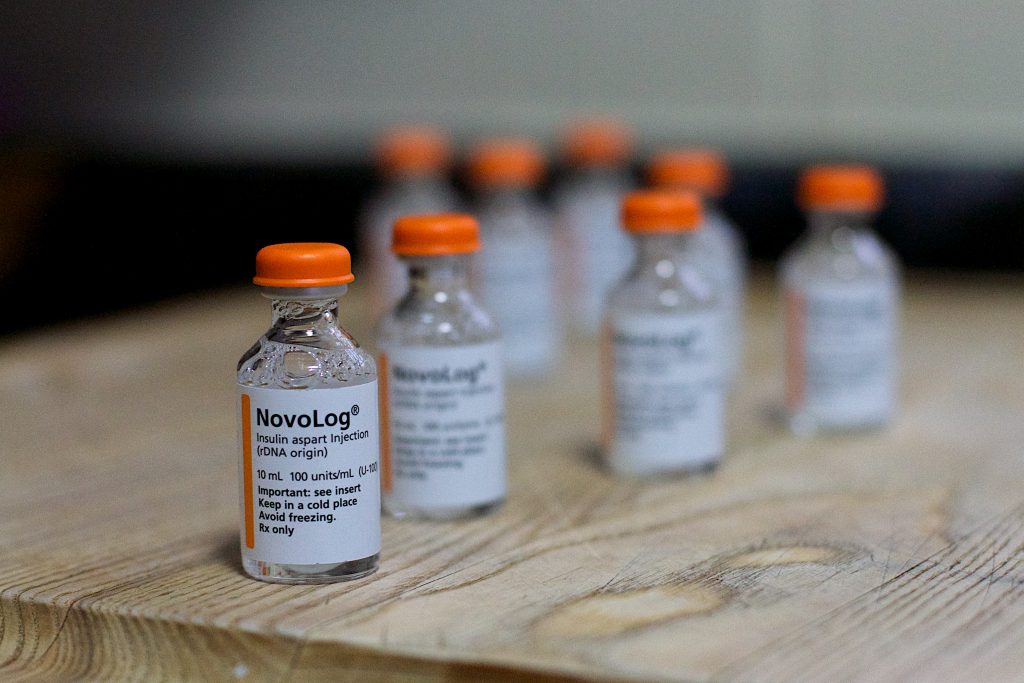Senate Action Possible on Prescription Drug Prices, Baldwin Says
Some GOP support needed to gain 60 votes for bill to lower drug prices.

Eight bottles of insulin. Photo by flickr user Alan Levine. (CC BY 2.0).
Federal legislation to rein in the cost of prescription drugs is still in play, according to a Wisconsin lawmaker who is sponsoring several such measures.
A bill that would lower patients’ out-of-pocket costs for insulin is circulating, and Democratic Sen. Tammy Baldwin says a Senate vote could come sometime “in the coming weeks.”
Baldwin said that when insulin prices doubled between 2012 and 2016, that was unnecessary because the diabetes treatment hasn’t changed much since its introduction 100 years ago.
She said she hopes that another provision she has advocated, allowing the federal Medicare program to negotiate drug prices with pharmaceutical manufacturers, can be revived this year as well.
“For seniors, the problem of inflation is only made worse by the ever-increasing price of prescription drugs,” said Lisa Lamkins, advocacy director for AARP-Wisconsin, which organized the March 24 news conference.
“If consumer prices had risen as fast as drug prices over the last 15 years, gas would now cost $12.20 a gallon and milk would be $13 a gallon,” Lamkins said. A six-pack of beer would cost about $29, a six-pack of brats about $12, “and cheddar cheese would be a little more than $17 a pound,” she added. “That’s a pretty expensive tailgate.”
“Lower prices actually means more access to drugs, “ Lamkins said. “Medicines don’t work if people can’t afford them.”
Karen Juteson, 70, said the cost of two recently developed, highly effective medications for her diabetes quickly put her in the Medicare prescription drug coverage gap, nicknamed the “donut hole,” requiring her to pay a portion of the cost. That out-of-pocket cost “was prohibitive,” she said, while lower-cost drugs that were offered as an alternative were less effective and came with unwanted side effects.
“It’s not just the uninsured and the low-income people who experience difficulty with the high cost of prescription medications,” Juteson said.
In her years as a hospital social worker, Susan Fadness frequently saw patients who could have avoided hospitalizations “if they had taken their prescribed medications,” Fadness said. “But they did not take the medications because of the costs.”
Medicare prescription drug negotiation was part of the Build Back Better budget package that stalled in the Senate after passing the U.S. House of Representatives in late 2021. That legislation also contained numerous components including paid family leave, support for child care providers and for parents who need child care services, and changes to help make the Affordable Care Act more accessible to lower- and moderate-income people.
“We are still quietly working to revive several sections of it, including, very importantly, the negotiation of prescription drugs,” Baldwin said. If that succeeds, the budget bill can pass on a simple majority without having to gain 60 votes, she noted.
Cutting prescription drug costs still priority in U.S. Senate, Baldwin says was originally published by the Wisconsin Examiner.






















Tammy Baldwin is a liar.
Baldwin transfers the cost of $1,000 per bottle prescription drugs to heath insurance companies.
Then the health insurance companies raise our rates to cover the $1,000 drug.
Then Baldwin publishes a press release, claiming she lowered the price of our prescription drugs.
Medicare’s Part B monthly premium for 2022 increased by $21.60 per month, the largest dollar increase in the health insurance program’s history… because Tammy Baldwin lies about lower prescription drug prices.